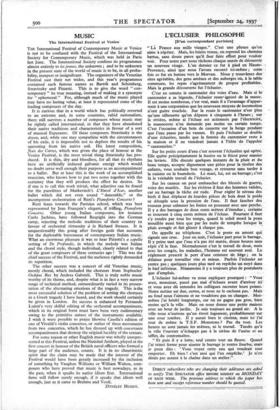MUSIC
The International Festival at Venice THE International Festival of Contemporary Music at Venice is not to be confused with the Festival of the International Society for Contemporary Music, which was held in Paris last June. The International Society confines its programmes almost entirely to les jeunes, the unknown ; and to be unknown in the present state of the world of music is to be, in all proba- bility, inexpert or insignificant. The organisers of the Venetian Festival cast their net wider, and this year's programmes contained such famous names as Bart& and Schonberg, Stravinsky and Pizzetti. This is to give the word " con- temporary " its true meaning, instead of making it a synonym' for " ephemeral." For, although much of the 'music played may have no lasting value, at least it represented some of the leading composers of the day.
It is curious that in a world which has politically reverted to an extreme and, in some countries, rabid nationalism, there still survives a number of composers whose music may be rightly called international, in that they have abandoned their native traditions and characteristics in favour of a sort of musical Esperanto. Of these composers Stravinsky is the doyen, and, while one may sympathise with the circumstances of his exile, it is impossible not to deplore the results of his uprooting from his native soil. His latest composition, Jeux des Cartes, which was given the place of honour at the Venice Festival, is the most trivial thing Stravinsky has pro- duced. It is thin, dry and bloodless, for all that its rhythms have an artificially induced galvanic energy which would no doubt serve well enough their purpose as an accompaniment to a ballet. But at least this is the work of an accomplished musician, who knows how to put two notes together with the certainty that they will produce the effect he desires. So if one is to call this work trivial, what adjective can be found for the puerilities of Markevitch's L'Envol d'Icar, another ballet which did not even sound " danceable," or the incompetent orchestration of Rieti's Pianoforte Concerto ?
Rieti leans towards the Parisian school, which was best represented by Jean Frangaix's elegant, if trifling, Pianoforte Concerto. Other young Italian composers, for instance Carlo Jachino, have followed Respighi into the German camp, rejecting the melodic traditions of their country in favour of orchestral virtuosity a la Richard Strauss. It is unquestionably this going after foreign gods that accounts for the deplorable barrenness of contemporary Italian music. What an enormous pleasure it was to hear Pizzetti's a capella setting of De Profundis, in which the melody was Italian and the choral style, though individual, clearly related to that of the great composers of three centuries ago ! This was the chief success of the Festival, and the audience rightly demanded its repetition.
The other success was a concert of old Venetian music, mostly choral, which included the choruses from Sophocles' Oedipus Rex by Andrea Gabrieli. This is truly noble music worthy of its theme, and, despite what is in fact a very narrow range of technical method, extraordinarily varied in its presen- tation of the alternating emotions of the tragedy. This is the most successful solution of the problem of setting the choruses in a Greek tragedy I have heard, and the work should certainly be given in London. Its success is enhanced by Fernando Luizzi's very skilful editing of the orchestral accompaniment, which in its original form must have been very rudimentary owing to the primitive nature of the instruments available. I wish it were possible to praise likewise Casella's edition of one of Vivaldi's violin concertos, or rather of three movements from two concertos, which he has dressed up with concertante accompaniments that destroy the original lucidity of the texture.
For some reason or other English music was wholly unrepre- sented at this Festival, unless the Natiohal Anthem, played at the first concert in honour of the British naval officers who formed a large part of the audience, counts. It is in no chauvinistic spirit that the claim may be made that the interest of the Festival would have been greatly increased by the inclusion of something by Vaughan Williams or William Walton, com- posers who have proved that music is best nowadays, as in the past, when it speaks its native idiom first. International fame will follow surely enough, if it speaks that idiom well enough, just as it came to Brahms and Verdi.
DYNELEY HUSSEY.


















































 Previous page
Previous page